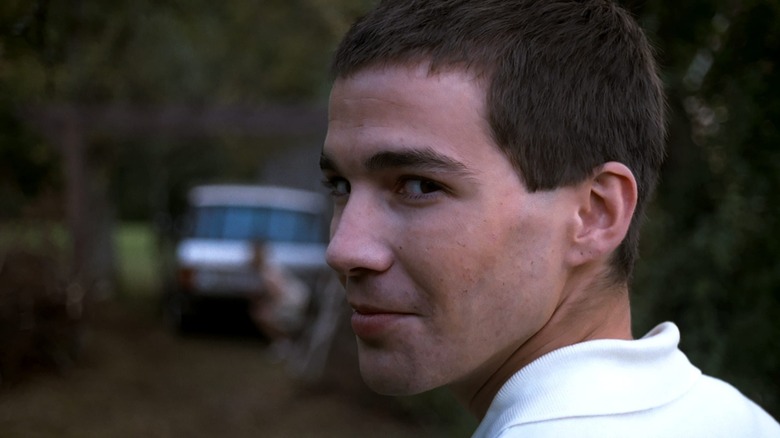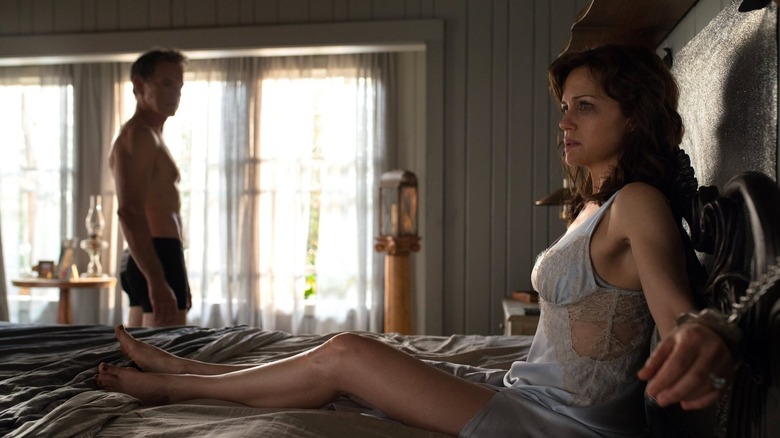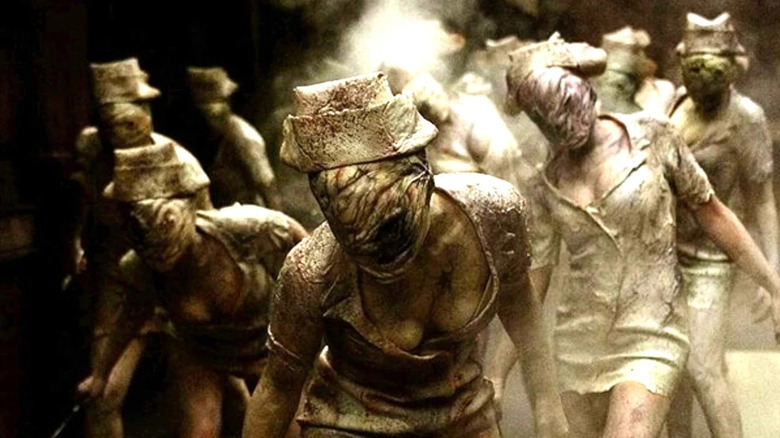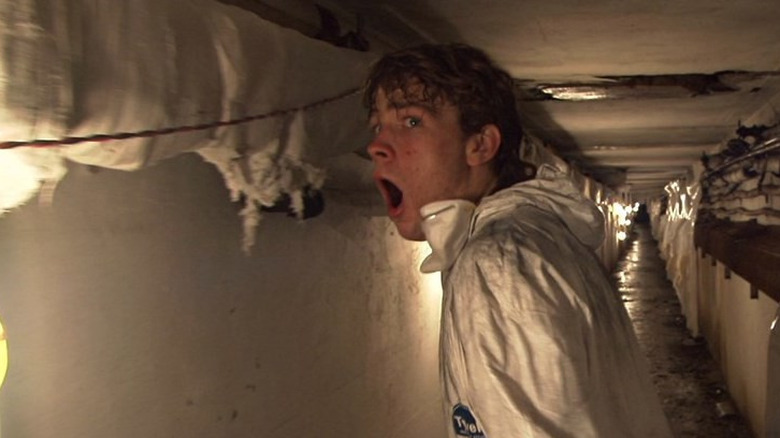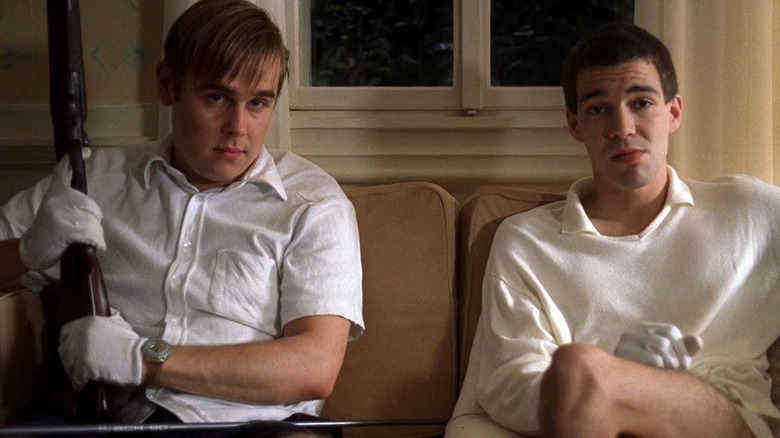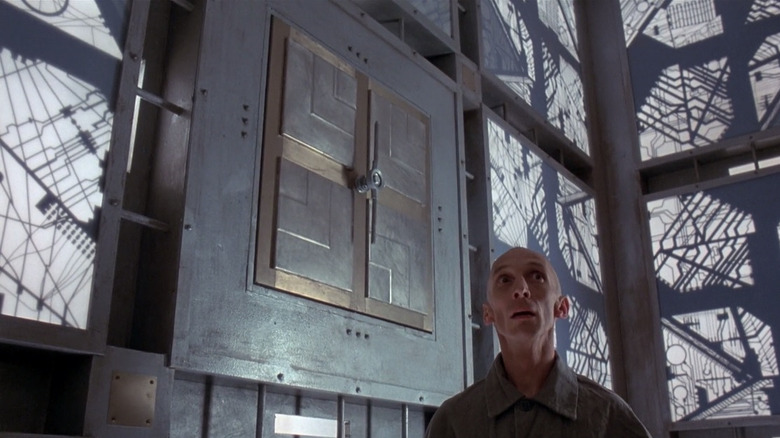5 Psychological Horror Movies The Average Person Would Never Survive
Psychological horror movies are, by definition, a head trip. Its protagonist-victims are put through the mental wringer, and their heightened mental disturbia propels most of the story's dread. Watching someone's grip on reality loosen irrevocably is scary by proxy; their dread becomes your dread.
Which psych-horror movies are survivable for the average person? The answer is hard to figure out. Stories in the genre can be intensely individual. The monstrous visions and bumps in the night that Vietnam vet Jacob Singer (Tim Robbins) sees in "Jacob's Ladder" are specific to him and his wartime experiences, so it's hard to say how anyone else might fare in the same position, with the same paranoia. Your mileage may also vary based on your own intestinal fortitude. Dropped into the plot of "The Silence of the Lambs," those afraid of the dark would have gotten shot by Buffalo Bill, while others wouldn't have made it past a thorough reading by Dr. Hannibal Lecter. You may recall that a fellow inmate of Lecter's swallowed his own tongue following a nighttime chat with the cannibal doctor.
But some mental trials are impassable, no matter how stoic the lead character is. "Gothika" and "Shutter Island" bring their respective leads to the brink of sanity as each reckons with their own unraveling psyches, solving riddles in spooky, remote settings where the transition from man to monster is not just plausible but inevitable. But processing trauma isn't always enough to make it to the end credits in this genre; some survivors had to show uncommon gumption or exceptional skill to get out of their situation alive.
Here are some psychological horror movies that are unlikely to have a happy ending for any average person dropped into them.
Gerald's Game (2017)
The first movie on the list is one thriller long thought to be unadaptable due to its heavy internal monologue. "Oculus" co-writer Jeff Howard was up to the task, collaborating with director Mike Flanagan once again, this time adapting Stephen King's 1992 bestselling novel "Gerald's Game" to the big screen. The book, set in a single location, involves a whole lot of internal dialogue as Jessie Burlingame (Carla Gugino) finds herself in a worst-case scenario: naked as a jaybird and handcuffed to a bed, her husband Gerald (Bruce Greenwood) dead on the floor, in a remote lake house with no help coming for days.
Jessie has the advantage of having several voices in her head (some good, some not so helpful) offering counsel while she tries to free herself. As Howard pointed out to /Film, "Whether it's represented in the book by all of her friends and neighbors and people she grew up with, or whether it's in this movie with Gerald, she's really just talking to herself."
In the movie, Jessie's situation becomes dire, having battled animals, dehydration, and possibly a deadly man made of moonlight over the course of a few days. She psychs herself up enough to perform a horrific medical procedure that the average person probably wouldn't have the gumption to pull off. Breaking a drinking glass and grabbing a busted shard, Jessie degloves her right hand to slip out of its cuff; King's book describes the freshly-sliced skin as "sliding the way a heavy object on a rug will slide if someone pulls on the rug." Caught in the same pickle, most would rather cross their fingers than skin them.
Silent Hill (2006)
Take the fear of losing someone you were in charge of, magnify that dread tenfold, and add cults and a thick atmosphere and you've got "Silent Hill," the 2006 psych-horror film adapted from Konami's disturbing 1999 video game. "Brotherhood of the Wolf" director Christophe Gans is behind the cinematic adaptation, which begins as a quest to find a lost sleepwalking child and unfolds into a historical mystery and eventually, an unending festival of nightmares.
Through its dense fog and "Jacob's Ladder"-inspired grime, the West Virginia town contains a collection of monsters including the town's Large Adult Son, known as Pyramid Head for obvious reasons, who have the ability to visit visceral, "Hellraiser"-level offenses upon the human body. A spectacularly gross sequence in the film has a child flayed alive and it appears to hurt mightily the entire time it's happening. When not dodging the towering butcher, a trinity of separate, tortured entities roam the gloomy town along with a ritualistic cult of zealots.
Any typical person dropped into Silent Hill would be wiped out before they could even get their bearings. Orienting oneself becomes complicated when the surroundings shift from creepy to bloodcurdling, like rotating gameshow prize displays. Overcoming these horrors involves an elaborate cleansing ritual and barbed wire dodging. Even when it's over, it's only over in the Hotel California sense: you can check out anytime you like, but you can never leave.
"Silent Hill" fans can check in for a fresh stay soon. A reboot is in the works with original director Christophe Gans, with an expected release date in 2023.
Session 9 (2001)
"Session 9" starts with a simple premise to isolate its canon fodder. Hired to clear away asbestos, a removal crew arrives at the closed-down Danvers State Mental Hospital with a tight turnaround time and a ton of dilapidated rooms to safely tidy up. A sprawling hilltop Kirkbride complex situated over 500 acres overlooking Boston to the south, Danvers had a lengthy history of treating patients for mental ailments, and not all of them were agreeable to their treatment plans.
A disembodied voice begins speaking to one of the men, Gordon ("The Lord of the Rings: The Rings of Power" star Peter Mullan). Shortly after that, the men break a cardinal rule of horror films, right after "never read the Latin aloud": Mike (Stephen Gevedon) discovers some mysterious audio tapes in the asylum and plays them, learning about a disturbed past patient named Mary Hobbes. Strange events occur, mixing with the growing tensions between the men and the rapidly-approaching deadline, culminating in a working-class nightmare with a genuinely unsettling ending.
The film celebrated its 20th anniversary last year when co-writers and director Stephen Gevedon and Brad Anderson teased an idea for multiple prequels, featuring eight "sessions" leading up to the events of the 2001 film. The audio tapes would be the running thread, in part because the horror genre is filled with victims who don't mind their own business. Just as the students of "Evil Dead" brought doom upon themselves by listening to demonic incantations on tape, few people can resist poking around in someone else's struggles and affairs.
Caught inside of the building's labyrinthine hallways with nothing more than lamplight when the sun goes down, the average person is unlikely to make it out alive.
Funny Games (1997)
Michael Haneke's "Funny Games" polarized audiences upon its release in 1997 (and again a decade later when Haneke remade his own movie) due to its subversive structure; not only do the bad guys win in this home invasion psych-out but they have active control of the plot.
A family's R & R-filled week at their lakeside vacation home is disrupted by the arrival of two young men who introduce themselves as Paul (Arno Frisch) and Peter (Frank Giering), though these are likely aliases. The pair proceed to insert themselves into the family's life, ostensibly by borrowing eggs (which they break) and "accidentally" plunging the house phone into a sink full of dishwater. Their behavior goes from annoying to unnerving to alarming as the family becomes hostages in their own home, subject to the whims of their unfeeling captors.
Sadistic party games ensue and — here's the part that's impossible to beat — every logical attempt to escape or disable the two men is thwarted. A victim escapes the house while the two men are out, and guess whose car she happens to flag down for help? At another point, one of the captives succeeds in shooting Peter, only to have Paul pick up a remote and rewind the movie itself to prevent the incident from happening. He punctuates this audience betrayal with a knowing, fourth-wall-breaking wink; awareness of genre expectations may save you from defeat in Woodsboro, but not here.
The premise of the movie is simple and there are no Jigsaw-style traps to rip the protagonists apart, but the impact of the (intentionally) offscreen violence is still felt, and there's nothing anyone can do to effectively stop it once the men cross the house's threshold. It's hard to survive a rigged game.
Cube (1997)
Pop quiz, hotshot: you wake up in a cube-shaped room that looks like one of Clive Barker's daydreams with entry points into other similar rooms, many of which are booby-trapped. One of the potential rooms has the numbers 517 478 565 labeled at its entrance. Is the room safe to enter or not?
That's why you're dead.
Vincenzo Natali wanted to make an inexpensive movie and set about it by pitching a story in which a single location could substitute for many. Using colored sliding panels to change its palette from scene to scene, one 15-foot room could represent over 500 cubed spaces — a hellish maze for its inhabitants to escape from. The result is Natali's "Cube," a 1997 sci-fi horror film that also counts as psychological. That is, the horror comes from something more abstract than a tentacled monster or masked slasher.
A varied group of strangers find themselves trapped in a series of cube-shaped rooms, whose configuration constantly shifts. Figuring out the mechanics and predictability of those shifts takes up a fair amount of the film's runtime, even among a group that includes a mathematics student and an ex-con skilled in prison escapes. There is no food or water available, either, placing a sense of urgency onto the ordeal.
They can't just go into rooms nimbly-bimbly; the film's opening scene has some poor soul (Julian Richings) dropping into the wrong cube and getting diced into stew chunks by a razor-sharp grate. Other rooms have flamethrowers and lasers, but there's a pattern to the traps. To get past them, one needs to have the expertise of several skilled professionals, including Cartesian coordinates and prime number factorization. Like any good escape room scenario, it's teams that will survive, not individuals.
